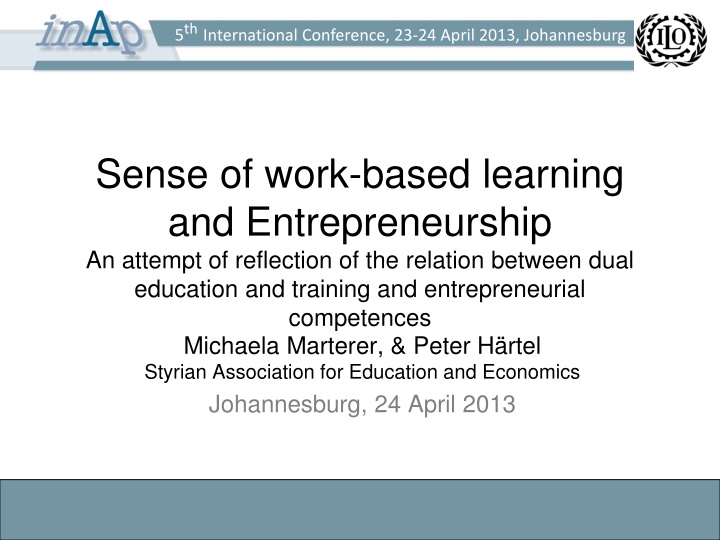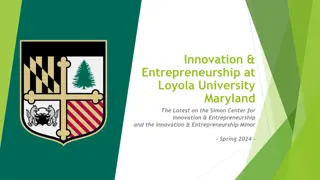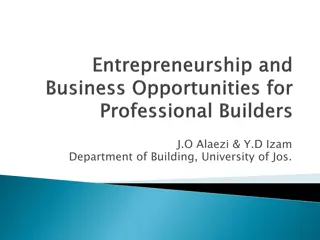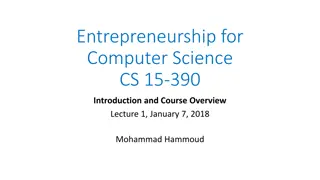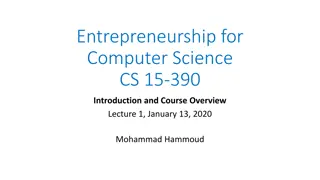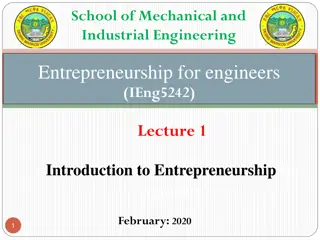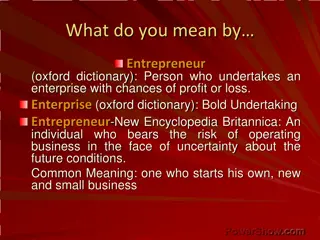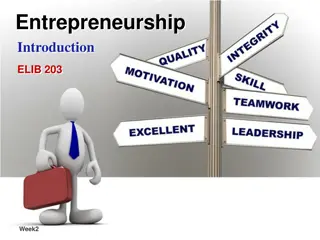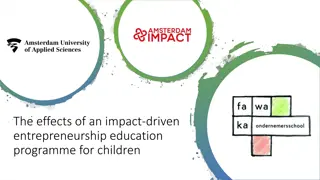Reflection on Dual Education and Entrepreneurship at 5th International Conference
Explore the relationship between dual education, training & entrepreneurial competences at the 5th International Conference in Johannesburg. Discover the impact of work-based learning on personal competences, connections to real workplaces, and the significance of entrepreneurial skills in today's world of work. Gain insights from research findings, comparisons, and recommendations for future programs and practices.
Download Presentation

Please find below an Image/Link to download the presentation.
The content on the website is provided AS IS for your information and personal use only. It may not be sold, licensed, or shared on other websites without obtaining consent from the author.If you encounter any issues during the download, it is possible that the publisher has removed the file from their server.
You are allowed to download the files provided on this website for personal or commercial use, subject to the condition that they are used lawfully. All files are the property of their respective owners.
The content on the website is provided AS IS for your information and personal use only. It may not be sold, licensed, or shared on other websites without obtaining consent from the author.
E N D
Presentation Transcript
5thInternational Conference, 23-24 April 2013, Johannesburg Sense of work-based learning and Entrepreneurship An attempt of reflection of the relation between dual education and training and entrepreneurial competences Michaela Marterer, & Peter H rtel Styrian Association for Education and Economics Johannesburg, 24 April 2013
5thInternational Conference, 23-24 April 2013, Johannesburg Rationale, Background Relation between innovative approaches of apprenticeship, work-based learning and entrepreneurship as a key element of personal competences for the world of work Connections to real work places in general and vocational education - aspects and effects for competences, transitions and employment Estimations of students, teachers, entrepreneurs concerning entrepreneurial knowledge, skills and attidudes
5thInternational Conference, 23-24 April 2013, Johannesburg Research approach Description, definitions for Work based learning and entrepreneurship Basic and background data concerning VET, Employment, Entrepreneurship related to the theme Interim results of an online survey in six European countries students, teachers, entrepreneurs concerning entrepreneurial competences Selected comparisons, theses, further topics Recommendations, next steps in research, programmes, practice
5thInternational Conference, 23-24 April 2013, Johannesburg Entrepreneurship enhance creativity and innovation, including entrepreneurship European Union, fourth long-term objective ET 2020 Entrepreneurship Definition Sense of initiative and entrepreneurship refers to an individual s ability to turn ideas into action. It includes creativity, innovation and risk-taking, as well as the ability to plan and manage projects in order to achieve objectives. This supports individuals, not only in their everyday lives at home and in society, but also in the workplace in being aware of the context of their work and being able to seize opportunities, and is a foundation for more specific skills and knowledge needed by those establishing or contributing to social or commercial activity. This should include awareness of ethical values and promote good governance Source: European Reference Framework Key Competences for Lifelong Learning, European Communities, 2007
5thInternational Conference, 23-24 April 2013, Johannesburg Work-based Learning Definition 1: Acquisition of knowledge and skills through carrying out and reflecting on tasks in a vocational context, either at the workplace (such as alterance training) or in a VET institution. Definition 2: programs for both secondary and post-secondary students which provide opportunities to achieve employment-related competencies in the workplace. Work-based learning is often undertaken in conjunction with classroom or related learning and may take the form of work placements, work experience, workplace mentoring, instruction in general workplace competencies and broad instruction in all aspects of industry. Source: Naidu, R. VET Glossary, NCVER, 2008 (Rev 2011)
5thInternational Conference, 23-24 April 2013, Johannesburg Percentage of individuals aged 18 to 64 who believe to have the required skills and knowledge to start a business in European countries, 2011 Source: Global Entrepreneurship Monitor 2011 Note: Italian result is from 2010.
5thInternational Conference, 23-24 April 2013, Johannesburg Students enrolled in vocational upper secondary education, 2010, as a % of all students enrolled in upper secondary education (ISCED level 3) Source: Cedefop, based on data from Eurostat, UOE data collection on education systems
5thInternational Conference, 23-24 April 2013, Johannesburg Proportion of VET students enrolled in combined work- and school-based VET, 2010, as % of all students in upper secondary VET (ISCED level 3) Source: Cedefop, based on data from Eurostat, UOE data collection on education systems
5thInternational Conference, 23-24 April 2013, Johannesburg Youth Unemployment in Europe Jugendarbeitslosigkeit J nner 2013 Eurostat 2013
5thInternational Conference, 23-24 April 2013, Johannesburg Self-reported skill mismatch Source: Quintini, G. (2011), Right for the Job: Over-Qualified or Under-Skilled? , OECD Social, Employment and Migration Working Paper, No. 120, OECD Publishing, Paris.
5thInternational Conference, 23-24 April 2013, Johannesburg Survey (Cross-Check) Comenius Network: Entrepreneurship Education and the World of Work 9 partners of 8 countries different institutions Survey on 25 entrepreneurial skills and abilities With the aim to: Compare the expectations of students, teachers and entrepreneurs within a changing world of work Evaluate different measures at school (internal and external) concerning the outputs Create a publication which fits for communication for raising awarness for entrepreneurial spirit and work based learning (target group = pratictionnaires - not researches)
5thInternational Conference, 23-24 April 2013, Johannesburg Valid data within the ongonig process by 15th of April valid data Total Entrepreneurs Total Entrepreneurs Students Teachers Students Teachers 0 500 1000 1500 2000 Teachers Students Entrepreneurs Total 421 1141 408 1970 valid data
5thInternational Conference, 23-24 April 2013, Johannesburg Answers divided in 3 target groups 350 300 250 Teachers 200 Students Entrepreneurs 150 100 50 0 AT BG EL ES IT SE 42 58 28 221 30 42 Teachers 197 81 280 383 110 90 Students 36 23 0 219 107 23 Entrepreneurs
5thInternational Conference, 23-24 April 2013, Johannesburg Country profiles e.g. Austria Learning how to learn Digital competence Risk management Social networking Problem solving To sell To present To negotiate To record To evaluate To de-brief teachers students To communicate To analyse To delegate entrepreneurs To lead To work self-reliantly To work in a group To make an effort for achieving goals in an activity To dedicate oneself to an activity To take responsibility for an activity To organise activities To identify and seize opportunities To devise a plan To turn ideas into actions To create new ideas 0 1 2 3 4 5 6 7 8 9 10
Learning how to learn Digital competence Risk management Social networking Problem solving To sell To present 5thInternational Conference, 23-24 April 2013, Johannesburg To negotiate To record Comparison profiles e.g. AT, ES, IT, SE e.g. for Q1 / answered by entrepreneurs To evaluate Learning how to learn To de-brief Digital To communicate competence SE IT ES AT Risk management To analyse Social networking To delegate Problem solving To lead To sell To work self- reliantly To present To work in a group To negotiate To make an effort for achieving goals in an activity To record To dedicate oneself to an activity To evaluate To take responsibility for an activity To de-brief To organise activities To communicate SE IT ES AT To identify and seize opportunities To analyse To delegate To devise a plan To lead To turn ideas into actions To work self- reliantly To create new ideas To work in a group 0,00 2,00 4,00 6,00 8,00 10,00 To make an effort for achieving goals in an activity To dedicate oneself to an activity To take responsibility for an activity To organise activities To identify and seize opportunities To devise a plan To turn ideas into actions To create new ideas 0,00 2,00 4,00 6,00 8,00 10,00
Learning how to learn Digital competence Risk management Social networking Problem solving To sell To present To negotiate To record To evaluate Learning how to learn To de-brief To communicate Digital competence SE IT ES AT To analyse Risk management To delegate To lead Social networking To work self- reliantly Problem solving To work in a group 5thInternational Conference, 23-24 April 2013, Johannesburg To make an effort for achieving goals in an activity To sell To dedicate oneself to an activity To present To take responsibility for an activity Related thesis: Countries like Austria with the apprenticeship system rate this skills and abilities very low To negotiate To organise activities To identify and seize opportunities To record To devise a plan To evaluate because the VET skills are more important for sucess in the working life and will be trained by the Enterprises, in their own responsibility, they do not expect the school is doing it in comparison with Spain and Italy. To turn ideas into actions To de-brief To create new ideas 0,00 2,00 4,00 6,00 8,00 10,00 To communicate SE IT ES AT To analyse To delegate To lead To work self- reliantly To work in a group To make an effort for achieving goals in an activity To dedicate oneself to an activity To take responsibility for an activity To organise activities To identify and seize opportunities To devise a plan To turn ideas into actions To create new ideas 0,00 2,00 4,00 6,00 8,00 10,00
5thInternational Conference, 23-24 April 2013, Johannesburg of all answers and countries of Question 1 - all target groups 10,00 8,00 Entrepreneurs Students Teachers 6,00 4,00 2,00 0,00 AT BG EL ES IT SE 6,52 7,84 0,00 7,94 9,93 6,94 Entrepreneurs 7,57 7,25 7,87 7,55 7,72 7,49 Students 7,80 7,43 8,77 7,92 8,22 7,78 Teachers
5thInternational Conference, 23-24 April 2013, Johannesburg of all answers and countries of Question 2 - all target groups: Students and Teachers 8,00 7,00 6,00 5,00 Students Teachers 4,00 3,00 2,00 1,00 0,00 AT BG ES IT SE 6,30 6,68 6,61 7,21 7,36 7,25 5,97 7,30 7,26 7,26 Students Teachers
5thInternational Conference, 23-24 April 2013, Johannesburg of all answers and countries of Question 3 - target group: Teachers 10,00 8,00 6,00 Teachers 4,00 2,00 0,00 AT BG ES IT SE 6,12 6,13 7,41 7,32 8,40 Teachers
5thInternational Conference, 23-24 April 2013, Johannesburg Interpretation of results to Q3: Which of these skills and abilities can you teach yourself in your daily work? Teachers of countries with less workbased learning principles e.g. Sweden, Spain, Italy have to fulfill more of the required skills and abilities within school.
5thInternational Conference, 23-24 April 2013, Johannesburg Themes-Topics-Theses AT: top estimation importance Students/teachers > entrepreneurs Activities supporting entrepreneurial spirit Teachers > students Which of the skills could you teach by yourself Highest score: to work in a group Lowest score: Learning to learn
5thInternational Conference, 23-24 April 2013, Johannesburg Themes-Topics-Theses ES Max Students < entrepreneurs Importance.. Entrepreneurship activity Students > teachers What can you teach Highest score: Learn to learn Lowest score: to sell
5thInternational Conference, 23-24 April 2013, Johannesburg Themes-Topics-Theses SE entrepreneurs=students=teachers Support by activity students = teachers What can you teach very self-confident overall Low score SE: To delegate To sell But: on a higher level..
5thInternational Conference, 23-24 April 2013, Johannesburg Premises, Promises, Pitfalls Estimations in school, by students and teachers and by entrepreneurs at a base for real working approaches are deeply founded by approaches of cultural aspects of education, VET, and entrepreneurship The culture of ownership for the next generation of skilled and occupational minded in enterprises and guilds Depending on that: expectations and demands to the state to create all relevant skills and competences
